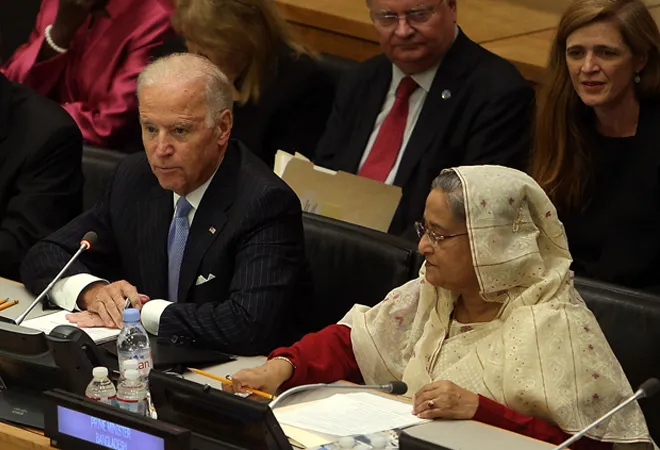
Bangladesh has had
amicable relations with the United States (US) since 1971, when the latter became one of the first countries to recognise it as an independent nation. Bilateral ties have grown steadily ever since, and the golden jubilee of their diplomatic relations was celebrated in 2022. At present, the US is Bangladesh’s third largest trading partner; the largest market for its Ready-Made Garments (RMG); the largest source of Foreign Direct Investment (FDI); and the largest investor in its energy sector. The United States Agency for International Development programme in Bangladesh is the biggest in Asia and features some of the world’s most important food security and health programmes. It is also active in overseeing a “
large humanitarian assistance portfolio in Bangladesh in response to the Rohingya crisis.” Naturally, the US enjoys goodwill amongst the citizens of Bangladesh, which increased during the pandemic as the US donated more than
100 million vaccine doses to Bangladesh, which proved
instrumental in the country’s national inoculation process. However, in recent years, the harmonious relations has been marred by the US’s discontentment with Bangladesh’s domestic socio-political scenario.
The United States Agency for International Development programme in Bangladesh is the biggest in Asia and features some of the world’s most important food security and health programmes.
US interpretation of the situation in Bangladesh
The root cause of the discord in US-Bangladesh relations is the former’s dissatisfaction with the human rights and democracy situation in the latter. In view of its interpretation of the situation in Bangladesh, the Government of the US imposed sanctions over allegations of human rights abuse on seven former and current high-level officials of Bangladesh’s
Rapid Action Battalion—the anti-crime/terrorism branch of the police force—in December 2021.
In 2022, the American Ambassador to Bangladesh, Peter Haas, met the
families of victims of alleged abductions, including the family of Sajedul Islam Sumon, a leader of the Bangladesh Nationalist Party (BNP)—the Opposition party in Bangladesh. Haas was rather critical in his opinion of the human rights situation in the country and voiced that, in the environment of political violence that characterises Dhaka, it is difficult to conduct “
free and fair elections”. He added that the press covering the elections should be protected from any kind of harassment. When questioned about the US’s interest in Bangladesh’s domestic affairs, Ambassador Haas maintained that the Biden administration’s key foreign policy focus is on democracy and human rights.
Conciliations and counters
The imposition of US sanctions had been a harsh reality check for Bangladesh as it had always been the former’s trusted ally. Thus, it sought to reassure the US that the situation in Bangladesh was being misinterpreted by vested groups, and it accepted the criticism as a constructive suggestion. Subsequently, Dhaka established a Human Rights Cell under the United Nations to monitor the human rights situation in Bangladesh; increased diplomatic communications and state-level visits between 2021-2022; maintained a neutral political stance on the Ukraine conflict; and complied with the US sanctions. At the 2022 US-Bangladesh
Security Dialogue, Dhaka also explained its position on human rights and democracy. Furthermore, in January 2023, a Russian ship,
Ursa Major, carrying goods for Bangladesh’s nuclear power plant in Rooppur, was prevented from berthing at the Mongla Port, as the ship was under US sanctions.
Although the US appreciated Bangladesh’s efforts, its censure continued. Again, in February 2023, the US State Department Counsellor, Derek Chollet, voiced concerns over the decline of democracy in Bangladesh and
warned that this would limit cooperation with the US. In the same month, Bangladesh was once again
left out of President Biden’s Democracy Summit for the second time after the first summit in December 2021. On 21 March this year, a few days before Bangladesh celebrated its 46
th Independence Day, the letter bearing the American President Joseph Biden’s wishes to PM Sheikh Hasina also hinted at maintaining human rights and democracy in Bangladesh. It stated: “
As Bangladesh approaches its next election, I am reminded of the deep value both of our nations’ people place on democracy, equality, respect for human rights, and free and fair elections.”
In January 2023, a Russian ship, Ursa Major, carrying goods for Bangladesh’s nuclear power plant in Rooppur, was prevented from berthing at the Mongla Port, as the ship was under US sanctions.
Despite Dhaka’s conciliatory efforts, these continued criticisms triggered fiery remark against the US from PM Sheikh Hasina, where she chastised the country for its own handling of democracy and human rights. She stated, “
In America, it is seen almost every day, people enter schools with weapons and shoot children and teachers, enter shopping malls and clubs and shoot there as well.” On democracy, she opined, “
Even today I say that the country gives us the guise of democracy with its words. Starting from our opposition party, some people are dancing and cheering with their words.” She accused the US of seeking a regime change in Bangladesh and said, “
They are trying to eliminate democracy and introduce a government that will not have a democratic existence….
They can overthrow the government in any country, particularly Muslim countries. As long as they were controlling over Islamic countries, nothing happened.” In a recent
BBC interview, PM Hasina claimed the US’s accusation to be without proof.
Clearly, the Bangladesh government has interpreted the American nudge towards proper implementation of human rights and democracy to be aligned with the allegations of the Opposition party. Indeed, the BNP has been accusing the Awami League Government of compromising these values in the country and conducting unfair elections in its rallies for the upcoming elections. The Opposition’s claims have also found an echo amongst the non-resident Bangladeshi BNP supporters in the US. Consequently, when PM Hasina reached Washington D.C. on 28 April
to attend the celebrations of the 50-year partnership between the World Bank and Bangladesh, protests broke out two blocks away from the White House, demonstrating against alleged ‘
autocracy’ and ‘
economic mismanagement’ in Bangladesh. While such outbursts are necessarily one-off incidents rooted in political opinions and biases, it is quite evident that US-Bangladesh relations have been strained of late.
Future of interdependence?
Despite these differences, Bangladesh remains largely dependent on the US for its economy and development, now more than ever, as it aspires to leave behind its Least Developed Country status and emerge as an
upper middle-income country by 2026. At the same time, the US firms,
their allies, and partners are increasingly seeking to make investments in Bangladesh’s market given its acceptance of the US private sector. The US also considers Bangladesh to be the “
centerpiece of its Indo-Pacific Strategy”, given its geostrategic position in the Bay of Bengal—an integral part of the Indo-Pacific—and its growing economic prowess. Accordingly, the US seeks to sign two defence pacts with Bangladesh: The
General Security of Military Information Agreement and the Acquisition Cross-Servicing Agreement, to further strengthen security in the Indo-Pacific. In such a situation, the growing discord in Bangladesh-US relations will serve neither country; instead it will hinder mutual strategic and economic aspirations, and eventually bear consequences for both.
Sohini Bose is a Junior Fellow with the Strategic Studies Programme at the Observer Research Foundation.
The views expressed above belong to the author(s). ORF research and analyses now available on Telegram! Click here to access our curated content — blogs, longforms and interviews.



 Bangladesh has had
Bangladesh has had  PREV
PREV


